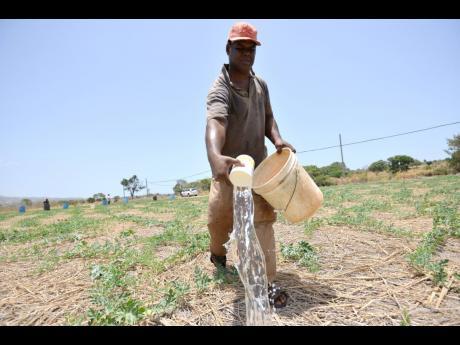RADA issues drought advisory for farmers
The Rural Agricultural Development Authority (RADA) has issued an advisory to farmers, warning them to be on drought alert and put in place alternative water sources for on-farm activities.
In the advisory it noted that February to April is the peak of the dry season.
It further pointed out that during January and February, the parishes of Westmoreland, St Elizabeth, St Catherine, Kingston and St Andrew, St Thomas, Portland, St Mary, Trelawny and Hanover experienced meteorological drought conditions with long-term drought expected up to May 2024.
It said these conditions are evolving in Westmoreland, St Elizabeth, Manchester and Portland.
RADA is urging farmers to follow updates, especially from the Meteorological Service of Jamaica to protect their production and rearing systems.
Tips for farmers on drought management:
- As much as possible, use irrigation systems efficiently and economically and as resources permit, e.g. gravity drip systems, small portable pumps, tanks for water storage.
- Irrigate in the early morning preferably. There is less chance of wind and lower evaporation rates.
- Do regular checks of your guttering systems to ensure that it is clear of debris to catch water from sporadic rainfall.
- Practise soil mulching with the aid of plastic or grass liners to retain soil moisture
- Plant seeds in trays instead of direct seeding in order to use available water more efficiently.
- Improve crop portfolio mix by planting drought- tolerant crops, e.g. cassava, pineapple, sweet potato, gungo peas, ginger.
- Harvest from mature crops on time to reduce water and heat stress on plants.
- Practise foliar fertiliser applications, control pests and weeds.
- For water retention - maintain land husbandry treatments such treatments as contour ditches, planting of crops along contour, individual basins, planting cover crops and minimal soil tillage.
- Maintain wind breaks around fields as this helps to reduce loss of water from the soil.
- void any activity that could result in fires. Maintain fire banks to prevent rapid spread of bush fires. Desist from the slash and burn method of clearing lands at this time.
For Livestock Farmers:
- Providing supplemental feed (grains, hay) may be necessary
- Supplemental minerals, vitamins or energy sources may be needed
- Check animals regularly for illnesses and dehydration
- Avoid overgrazing If you plan to feed drought damaged crops (e.g. feed, forages) to livestock be aware of these issues:
- Drought conditions can reduce the nutrient quality of forages and lower forage succulence and protein content
- Dry forages are hard to digest
- Drought can increase plant toxicities (e.g. nitrates, mycotoxins)
Follow The Gleaner on X and Instagram @JamaicaGleaner and on Facebook @GleanerJamaica. Send us a message on WhatsApp at 1-876-499-0169 or email us at onlinefeedback@gleanerjm.com or editors@gleanerjm.com.

